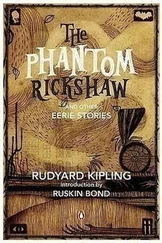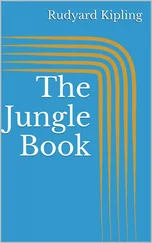"Nay, thou must not mock thy brother," said Messua, catching him to her breast. "When thou art one half as fair we will marry thee to the youngest daughter of a king, and thou shalt ride great elephants."
Mowgli could not understand one word in three of the talk here; the warm milk was taking effect on him after his long run, so he curled up and in a minute was deep asleep, and Messua put the hair back from his eyes, threw a cloth over him, and was happy. Jungle–fashion, he slept out the rest of that night and all the next day; for his instincts, which never wholly slept, warned him there was nothing to fear. He waked at last with a bound that shook the hut, for the cloth over his face made him dream of traps; and there he stood, his hand on his knife, the sleep all heavy in his rolling eyes, ready for any fight.
Messua laughed, and set the evening meal before him. There were only a few coarse cakes baked over the smoky fire, some rice, and a lump of sour preserved tamarinds—just enough to go on with till he could get to his evening kill. The smell of the dew in the marshes made him hungry and restless. He wanted to finish his spring running, but the child insisted on sitting in his arms, and Messua would have it that his long, blue–black hair must be combed out. So she sang, as she combed, foolish little baby–songs, now calling Mowgli her son, and now begging him to give some of his jungle power to the child. The hut door was closed, but Mowgli heard a sound he knew well, and saw Messua's jaw drop with horror as a great gray paw came under the bottom of the door, and Gray Brother outside whined a muffled and penitent whine of anxiety and fear.
"Out and wait! Ye would not come when I called," said Mowgli in jungle–talk, without turning his head, and the great gray paw disappeared.
"Do not—do not bring thy—thy servants with thee," said Messua. "I—we have always lived at peace with the Jungle."
"It is peace," said Mowgli, rising. "Think of that night on the road to Kanhiwara. There were scores of such folk before thee and behind thee. But I see that even in springtime the Jungle People do not always forget. Mother, I go."
Messua drew aside humbly—he was indeed a wood–god, she thought; but as his hand was on the door the mother in her made her throw her arms round Mowgli's neck again and again.
"Come back!" she whispered. "Son or no son, come back, for I love thee—Look, he too grieves."
The child was crying because the man with the shiny knife was going away.
"Come back again," Messua repeated. "By night or by day this door is never shut to thee."
Mowgli's throat worked as though the cords in it were being pulled, and his voice seemed to be dragged from it as he answered, "I will surely come back."
"And now," he said, as he put by the head of the fawning wolf on the threshold, "I have a little cry against thee, Gray Brother. Why came ye not all four when I called so long ago?"
"So long ago? It was but last night. I—we—were singing in the Jungle the new songs, for this is the Time of New Talk. Rememberest thou?"
"Truly, truly."
"And as soon as the songs were sung," Gray Brother went on earnestly, "I followed thy trail. I ran from all the others and followed hot–foot. But, O Little Brother, what hast thou done, eating and sleeping with the Man–Pack?"
"If ye had come when I called, this had never been," said Mowgli, running much faster.
"And now what is to be?" said Gray Brother.
Mowgli was just going to answer when a girl in a white cloth came down some path that led from the outskirts of the village. Gray Brother dropped out of sight at once, and Mowgli backed noiselessly into a field of high–springing crops. He could almost have touched her with his hand when the warm, green stalks closed before his face and he disappeared like a ghost. The girl screamed, for she thought she had seen a spirit, and then she gave a deep sigh. Mowgli parted the stalks with his hands and watched her till she was out of sight.
"And now I do not know," he said, sighing in his turn. " Why did ye not come when I called?"
"We follow thee—we follow thee," Gray Brother mumbled, licking at Mowgli's heel. "We follow thee always, except in the Time of the New Talk."
"And would ye follow me to the Man–Pack?" Mowgli whispered.
"Did I not follow thee on the night our old Pack cast thee out? Who waked thee lying among the crops?"
"Ay, but again?"
"Have I not followed thee to–night?"
"Ay, but again and again, and it may be again, Gray Brother?"
Gray Brother was silent. When he spoke he growled to himself, "The Black One spoke truth."
"And he said?"
"Man goes to Man at the last. Raksha, our mother, said—"
"So also said Akela on the night of Red Dog," Mowgli muttered.
"So also says Kaa, who is wiser than us all."
"What dost thou say, Gray Brother?"
"They cast thee out once, with bad talk. They cut thy mouth with stones. They sent Buldeo to slay thee. They would have thrown thee into the Red Flower. Thou, and not I, hast said that they are evil and senseless. Thou, and not I—I follow my own people—didst let in the Jungle upon them. Thou, and not I, didst make song against them more bitter even than our song against Red Dog."
"I ask thee what thou sayest?"
They were talking as they ran. Gray Brother cantered on a while without replying, and then he said,—between bound and bound as it were,—"Man–cub—Master of the Jungle—Son of Raksha, Lair–brother to me—though I forget for a little while in the spring, thy trail is my trail, thy lair is my lair, thy kill is my kill, and thy death–fight is my death–fight. I speak for the Three. But what wilt thou say to the Jungle?"
"That is well thought. Between the sight and the kill it is not good to wait. Go before and cry them all to the Council Rock, and I will tell them what is in my stomach. But they may not come—in the Time of New Talk they may forget me."
"Hast thou, then, forgotten nothing?" snapped Gray Brother over his shoulder, as he laid himself down to gallop, and Mowgli followed, thinking.
At any other season the news would have called all the Jungle together with bristling necks, but now they were busy hunting and fighting and killing and singing. From one to another Gray Brother ran, crying, "The Master of the Jungle goes back to Man! Come to the Council Rock." And the happy, eager People only answered, "He will return in the summer heats. The Rains will drive him to lair. Run and sing with us, Gray Brother."
"But the Master of the Jungle goes back to Man," Gray Brother would repeat.
"Eee—Yoawa? Is the Time of New Talk any less sweet for that?" they would reply. So when Mowgli, heavy–hearted, came up through the well–remembered rocks to the place where he had been brought into the Council, he found only the Four, Baloo, who was nearly blind with age, and the heavy, cold–blooded Kaa coiled around Akela's empty seat.
"Thy trail ends here, then, Manling?" said Kaa, as Mowgli threw himself down, his face in his hands. "Cry thy cry. We be of one blood, thou and I—man and snake together."
"Why did I not die under Red Dog?" the boy moaned. "My strength is gone from me, and it is not any poison. By night and by day I hear a double step upon my trail. When I turn my head it is as though one had hidden himself from me that instant. I go to look behind the trees, and he is not there. I call and none cry again; but it is as though one listened and kept back the answer. I lie down, but I do not rest. I run the spring running, but I am not made still. I bathe, but I am not made cool. The kill sickens me, but I have no heart to fight except I kill. The Red Flower is in my body, my bones are water—and—I know not what I know."
Читать дальше












